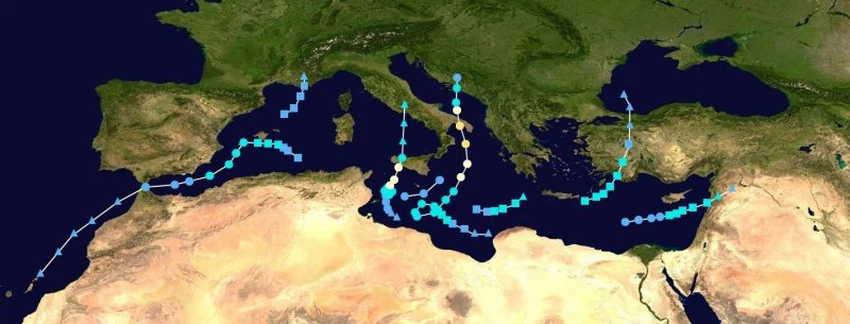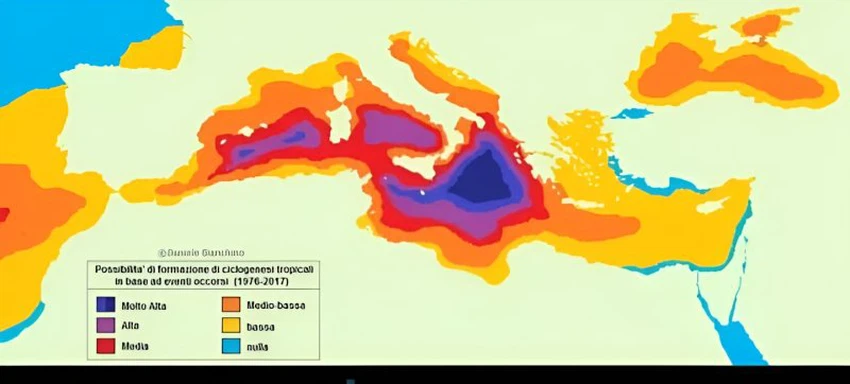Due to Mediterranean warming... Mediterranean storms are becoming more frequent and intense
Arab Weather - Weather experts at the Arab Weather Regional Center said that with the climate changes that the world is witnessing due to the increasing impact of the global warming phenomenon, and as part of the world and vulnerable to climate change, the Mediterranean Sea is witnessing severe and prolonged marine heat waves in recent years, up until this year, which led to the Mediterranean Sea being considered a hotspot for climate and biological change by international weather organizations.
Marine heatwaves are becoming more frequent and intense in the Mediterranean due to climate change.
In detail, weather experts at the Arab Weather Regional Center reported that the Mediterranean region has been witnessing, over the past few years, specifically in 2023 and 2024, severe and prolonged marine heat waves. In previous summers and up until this summer, Arab Weather experts noted that the heat waves that the Mediterranean Sea is exposed to are frequent and strong at the same time, and this is attributed to the changes in weather patterns in the northern hemisphere, represented by the continuous rush of hot air masses in the summer from the African continent towards the south of the European continent, thus crossing the waters of the Mediterranean Sea.
Mediterranean storms in the Mediterranean Sea are becoming more frequent and intense due to climate change.
In a study conducted by the weather forecasting team at the Arab Weather Center, it was found that Mediterranean storms have increased in frequency and growth over the Mediterranean Sea in recent years. With the increase in the surface temperature of the Mediterranean Sea due to heat waves, these storms have gained greater strength and higher atmospheric momentum in recent years. Perhaps the closest example of this is Storm Daniel in September 2023, which hit Libya, for example, from the Arab world, and before that it directly affected Greece.

Meteorologists consider the continued warming of the Mediterranean Sea's surface to be the main reason for the increase in the intensity and frequency of this type of storm, as the high temperatures of the surface of the water lead to an increase in evaporation processes, and thus the atmosphere becomes congested with large amounts of water vapor. When the cold upper basins descend from the European continent towards the surface of the warm waters and the weather conditions are available for their separation from the general circulation of the jet stream, they begin to feed on the warmth and moisture of the surface of the water and begin to acquire characteristics similar to those of storms in tropical and equatorial regions (but on a smaller scale), especially in terms of structure, cloud density and their rotational movement.
Favorable weather conditions for the recurrence of Mediterranean storms, which have a long history in the Mediterranean waters.
With the increase in surface water heating and the recurrence of marine heat waves, Arab Weather experts indicated that Mediterranean storms could increase in intensity and frequency over time due to climate changes that the world is witnessing, especially the rise in the temperature of water bodies, of which the Mediterranean Sea is one and the most vulnerable to climate change. Although this type of storm has occurred several times throughout history, it may recur more frequently than before and carry higher intensity and momentum. In the following map, we find that the central Mediterranean region is the most vulnerable to the formation of this type of storm.

Returning to the climate records, we see that the Mediterranean region has witnessed this type of storms, for example, the Medicane "Maximo" that directly hit Sicily in January 1982, and the Medicane of January 1995 between Italy, Greece and Libya, and also the Medicane Casilda in 2020.
What marine heat waves directly affect the Mediterranean?
Arab Weather experts defined marine heatwaves as long periods of abnormally high temperatures in ocean or sea waters. This phenomenon occurs when surface water temperatures rise significantly above normal, and last for a long period ranging from several days to weeks or even months.
Marine heat waves are considered a dangerous phenomenon because they can lead to clear and significant impacts on weather patterns over seas and oceans, which have repercussions on coastal countries. Marine heat waves also have an impact on marine ecosystems, such as destroying coral reefs, changing migration patterns of fish and other marine organisms, and exposing marine life to significant risks. Climate change often causes an increase in the frequency and severity of marine heat waves.
God knows best.
Read also:
New Record: Mediterranean Sea Records Hottest Average in Decades
Mediterranean Sea Warming: Will History Repeat Itself with Hurricane Daniel?
Arabia Weather App
Download the app to receive weather notifications and more..



